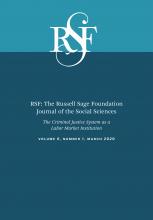Research Article
Open Access
On Thin Ice: Bureaucratic Processes of Monetary Sanctions and Job Insecurity
Michele Cadigan, Gabriela Kirk
RSF: The Russell Sage Foundation Journal of the Social Sciences March 2020, 6 (1) 113-131; DOI: https://doi.org/10.7758/RSF.2020.6.1.05
Michele Cadigan
aPhD candidate in sociology at the University of Washington
Gabriela Kirk
bPhD candidate in sociology at Northwestern University

REFERENCES
- ↵
- ACLU
- ↵
- Alexander, David,
- Jan Montgomery,
- Geoff Hamilton,
- Darryl Dutton, and
- Richard Griswold
- ↵
- Appleman, Laura I
- ↵
- Bannon, Alicia,
- Rebekah Diller, and
- Mitali Nagrecha
- ↵
- ↵
- Brayne, Sarah
- ↵
- Brett, Sharon, and
- Mitali Nagrecha
- ↵
- Cahill, Meagan
- ↵
- Carnegie, Jon
- ↵
- Carnegie, Jon, and
- Robert Eger III.
- ↵
- Clear, Todd R
- ↵
- Colgan, Beth A
- ↵
- Colgan, Beth A
- ↵
- Cozzolino, Elizabeth
- ↵
- Diller, Rebekah
- ↵
- Edelman, Peter
- ↵
- Elliott, Sinikka, and
- Sarah Bowen
- ↵
- Ervin, Laurie, and
- Anne Schneider
- ↵
- Eubanks, Virginia
- ↵
- Feeley, Malcolm
- ↵
- Fernandes, April,
- Michele Cadigan,
- Frank Edwards, and
- Alexes Harris
- ↵
- ↵
- ↵
- Gilliom, John
- ↵
- Goffman, Alice
- ↵
- Gordon, Margaret A., and
- Daniel Glaser
- ↵
- Harding, David J.,
- Jeffrey D. Morenoff,
- Anh P. Nguyen, and
- Shawn D. Bushway
- ↵
- Harding, David J.,
- Jeffrey D. Morenoff,
- Anh P. Nguyen, and
- Shawn D. Bushway
- ↵
- Harris, Alexes
- ↵
- ↵
- Harris, Alexes,
- Heather Evans, and
- Katherine Beckett
- ↵
- Harris, Alexes,
- Beth M. Huebner,
- Karin D. Martin,
- Mary Pattillo,
- Becky Pettit,
- Sarah Shannon,
- Bryan L. Sykes,
- Christopher Uggen, and
- April Fernandes
- ↵
- Hillsman, Sally T
- ↵
- Jacobs, Susan, and
- David C. Moore
- ↵
- Kaeble, Danielle,
- Lauren Glaze,
- Anastasios Tsoutis, and
- Todd Minton
- ↵
- Kaiser, Joshua
- ↵
- Kohler-Hausmann, Issa
- ↵
- Kohler-Hausmann, Issa
- ↵
- Langton, Lynn, and
- Matthew Durose
- ↵
- Lind, E. Allan, and
- Tom R. Tyler
- ↵
- Luker, Kristin
- ↵
- Marsh, Andrea
- ↵
- Martin, Karin D
- ↵
- Martin, Karin D.,
- Bryan L. Sykes,
- Sarah Shannon,
- Frank Edwards, and
- Alexes Harris
- ↵
- National Center for Victims of Crime
- ↵
- National Research Council
- ↵
- Olson, David E., and
- Gerard F. Ramker
- ↵
- Outlaw, Maureen C., and
- R. Barry Ruback
- ↵
- Pager, Devah
- ↵
- Petersilia, Joan
- ↵
- Phelps, Michelle S
- ↵
- Rosenbaum, David,
- Nicole Hutsell,
- Alan Tomkins,
- Brian Bornstein,
- Mitchel Herian, and
- Elizabeth Neeley
- ↵
- Ruback, R. Barry, and
- Mark H. Bergstrom
- ↵
- Ruback, R. Barry, and
- Jennifer N. Shaffer
- ↵
- ↵
- Seim, Josh
- ↵
- ↵
- Simon, Jonathan
- ↵
- Soss, Joe,
- Richard C. Fording, and
- Sanford F. Schram
- ↵
- Thibaut, John W., and
- Laurens Walker
- ↵
- Travis, Jeremy
- ↵
- Uggen, Christopher,
- Mike Vuolo,
- Sarah Lageson,
- Ebony Ruhland, and
- Hilary K. Whitham
- ↵
- Vanhaelemeesch, Delphine,
- Tom Vander Beken, and
- Stijn Vandevelde
- ↵
- ↵
- Wakefield, Sara, and
- Christopher Uggen
- ↵
- Warner, Cody,
- Joshua Kaiser, and
- Jason N. Houle
- ↵
- Werth, Robert
- ↵
- Western, Bruce
- ↵
- Western, Bruce
- ↵
- ↵
- Young, Kathryne M., and
- Joan Petersilia
- ↵
In this issue
On Thin Ice: Bureaucratic Processes of Monetary Sanctions and Job Insecurity
Michele Cadigan, Gabriela Kirk
RSF: The Russell Sage Foundation Journal of the Social Sciences Mar 2020, 6 (1) 113-131; DOI: 10.7758/RSF.2020.6.1.05
Jump to section
Related Articles
- No related articles found.
Cited By...
- No citing articles found.





